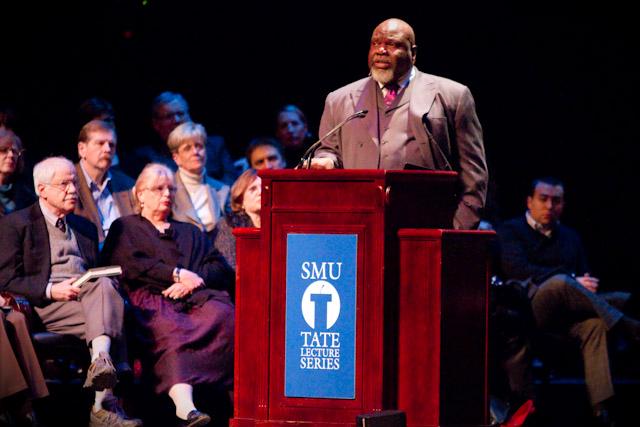
Bishop T.D. Jakes, chief pastor of The Potter’s House Church in southern Dallas County, speaks at the Gregg and Molly Engels lecture, part of the Tate Lecture Series, Tuesday evening inside McFarlin Auditorium. (MICHAEL DANSER/The Daily Campus)
Bishop T.D. Jakes, founder of Potter’s House, spoke on “Seeking Common Good in the Midst of Growing Diversity” at the Gregg and Molly Engles Lecture of the 2010-11 Tate Lecture Series Tuesday evening.
Jakes compared diversity to marriage, explaining that “just because two people share the same space, does not mean you have the same experience” to a full audience in McFarlin Auditorium.
A marriage is built on a relationship. Diversity can be overcome with a relationship. Both require people to teach each other and “find the common ground in the midst of differences.”
“Relationships are hard work, but are so fruitful when two groups come together,” Jakes said.
He stressed the importance of the intent and the responsibility Americans have to pursue and understand diversity.
“We are our brothers keeper,” Jakes said. “When it comes down to it, when rubber meets the road, we want the same thing.”
Jakes expressed his fear of the water starting to boil.
We are in a “staggering and changing world,” Jakes said. “We can hide, but if we hide, we run the risk of loosing everything.”
He furthered, explaining that in 9/11 other countries viewed Americans as alike. They did not attack just whites or just blacks or just Jewish people or just Christians. Our enemies saw us as one, while we viewed ourselves as different.
“It is dangerous for our enemy to know something about you that you don’t even know about yourself,” Jakes said.
The industrial stage brought people together for people relied on other’s strengths, but now, the information stage is bringing people back to square one, according to Jakes.
Like a marriage, power and money affect diversity. People cannot compete, rather they must understand each other and get along.
“Education cannot be used in isolation,” Jakes said.
Professors and students at SMU agreed with Jakes that people should try and step out of their comfort zones at school.
“This is one of the most meaningful talks we have had at SMU,” CCPA professor Dr. Maria Dixon said. “This is an opportunity for us to move past what we’ve heard on TV.”









